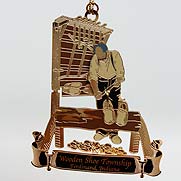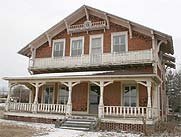2009 Essays: Honorable Mention — Inventions by Kaci Kreilein
In the modern world we have invented ways of speeding up invention, and people’s lives change so fast that a person is born into one kind of world, grows up in another, and by the time his children are growing up, lives in still a different world. —Margaret Mead
Forced out by larger corporations, mom-and-pop shops that once covered the United States barely exists today. The term superstore originated many years ago. Living in small towns with little or no transportation readily available, Americans began to shop at these superstores. Most small stores eventually closed as a result of advances in transportation. It became more economical for businesses to buy in bulk rather than in smaller quantities.
One of these stores existed in the small town of St. Anthony, Indiana. Because of one man, John Wibbels, patrons did not have to travel far to purchase goods needed for everyday life. (St. Anthony 3) In 1897, John bought the store previously owned by Mike Demuth for a mere $300 and built a new storefront (Dubois County 566). Located across from the present-day St. Anthony Church, the two-story building served many villagers (Wibbels). With a wood counter running the length of the store and a functioning potbelly stove located in the middle of the first floor, the store operated year-round (Kreilein).
However, in 1901 John passed the business down to his two sons, Ben and Henry. The two men shared the Wibbels Brothers’ General Store and also built a warehouse and grain elevator. (St. Anthony 3) According to Marcella Bromm, daughter of Henry Wibbels, the warehouse located in Kyana stored wheat and clover seed bought from local farmers. When it came time to sell the seed, a Crothersville company traveled by horse and buggy to pick up the product. The brothers’ grain elevator in St. Marks sat near railroad tracks. Many goods sold at the store arrived from great distances via train. Carrying freight and passengers, the train offered the people of St. Anthony transportation to nearby cities including Jasper and Huntingburg.
Furthermore, in 1920 the brothers decided to split the business. Henry oversaw the grain elevator, later adding a machinery shop. Managing the general store, Ben and his wife Minnie spent endless hours taking care of their version of an early superstore. (St. Anthony 3) When business seemed sluggish, Minnie and Henry’s wife Anna took advantage of the down time in the store, designing what would become identical houses. The houses became a reality, but the sister-in-laws built on opposite sides of town. Both still stand today and look indistinguishable from the outside.
Janice Kreilein, Henry’s granddaughter, can recall visiting the store after church every Sunday. Her mother Marcella would call ahead, and Uncle Ben and Aunt Minnie would have the week’s bread ready. Once church let out, she and her siblings raced across the street to the store to pick out candy that their father bought them weekly. Having no set store hours, Ben usually stayed until 10:00 or 11:00 each night. When a customer needed goods, the keeper would retrieve the items as the client waited. Clients and keepers communicated in German. Downstairs, Ben offered groceries, material bolts to make clothing, and religious items such as candles, rosaries, and prayer books. The religious candle mass—a practice no longer offered at St. Anthony—took place annually on February 2. This event prompted Ben to bundle candles two for 25 cents. He labeled the bundles and placed them in a basket, and then took them across the street to the church for a blessing from the priest. (Bromm) Clothing, hardware, and shoes were located on the second level. “Shoe” boxes often left the store with moonshine in them rather than family footwear. During Prohibition, Ben’s brother-in-law prepared the alcohol on the family farm and made it available for purchase at the store. Once a customer bought the moonshine, Ben wrote his or her name on a list. If Ben heard news of revenuers coming near, he contacted the names on the list to warn them. “We used to see and smell it coming out of the gutters on people’s homes,” said Marcella Bromm. To much surprise, the store never ended up in trouble with the law.
A third brother, Herman, provided butchering services offered by the store. Farmers skinned their animals at home before bringing them to the store for further processing. Because the Wibbels brothers owned an underground cellar and an abundant supply of ice blocks to keep the meat chilled, locals toke only a week’s supply of meat home at one time. To keep the meat and other products cold, the brothers cut nearby lakes into ice blocks every winter. They then covered the blocks with sawdust and packed them in a barn. Anytime the family needed ice for lemonade or making ice-cream, one of the children retrieved a block from the shed. (Bromm) In the winter, the lakes served as an appliance most families now use daily: a freezer.
The store truly did carry all household supplies. It also included the town post office. Delivered to St. Marks via train, Henry then brought the mail to the store for pick-up. Customers could buy groceries for the week and pick up their mail at one location. Eventually, the post office moved out of the general store to another location in St. Anthony. (St. Anthony 3)
When purchasing materials from the general store, patrons often bought goods on credit or traded butter and eggs from home. “Everyone trusted everybody,” stated Marcella. Sometimes Ben didn’t receive pay at all for the merchandise taken from the store. This system worked partly because Ben invested a vast amount of money in the stock market. Daily, he sat in the store listening to the rise and fall in the market. Patrons knew to wait until after the radio announcers finished listing stock prices before asking Mr. Wibbels for assistance. Ben and Henry both kept money in many local banks as well as investing in the stock market. Hearing news about the Huntingburg bank getting ready to go under, Henry removed all of his money and relocated it to other places. A few days later the bank did indeed go under. Ben on the other hand failed to remove all of his money from the bank before it closed. When the bank closed, Ben lost all of his deposits except for the 33% that the bank paid back in later years. This misfortune also happened to Henry’s children Arthur and Marcella twice, each time only receiving the promised 33%. (Bromm)
Despite the money mishap, the store remained part of the St. Anthony community for many years to come. Eventually the store closed its doors in 1963 when the Ben Wibbels family finally gave up the general store business. Torn down in 1964 (St. Anthony 3), the store no longer exists, but memories of its relevance still remain in the minds of many St. Anthony citizens. The Wibbels Brothers’ General Store served the town’s needs for many years.
Primarily, the closing of the store occurred because of advances in transportation and community members seeking employment away from family farms. Families in small towns started replacing horses with cars, making traveling greater distances faster and more feasible. The two concepts combined contributed to the slow death of an American icon—mom-and-pop general stores. With the people of small towns traveling farther away for work, shopping in larger cities became more prevalent. The small town mom-and-pop stores prices could not with the larger cities’ stores. It is much cheaper to buy items in larger quantities than a few at a time. When visualizing a superstore, most people see stores such as Wal-Mart. Yet, a few proud Americans remember the forerunner superstores small town businesses like the Wibbels Brothers’ General Store. The store provided customers with many services under one roof and the ability to buy on credit. This business served the people of St. Anthony for many years.



